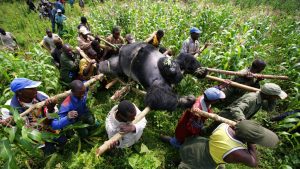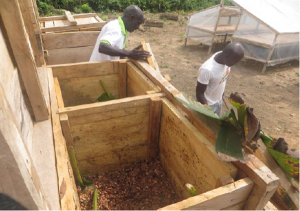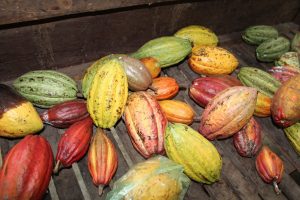
People approach in the TDC coaching sessions
These cocoa cooperatives aim to sell as much of their members’ cocoa as possible at the best conditions possible. But doing so is far from evident.

These cocoa cooperatives aim to sell as much of their members’ cocoa as possible at the best conditions possible. But doing so is far from evident.

The production process that turns the cocoa bean into a chocolate bar requires many intermediary steps and involves multinational corporations. More and more chocolatiers all over the world now want to take the whole process in their own hands.

Three Belgians are about to open a chocolate factory near Virunga, Africa’s largest tropical rainforest reserve. This Unesco World Heritage site is run by a Belgian, Prince Emmanuel de Merode. He is one of three investors, along with the Belgian chocolatier Dominique Persoone and Dimitri Moreels, the owner of cocoa-exporting Copak.

In recent years, many fair and sustainable trade cooperatives and small businesses from partner countries of the
Belgian Development Cooperation received support of the
Trade for Development Centre. Either in the form of
financial support or via coaching in marketing or finance and
business management, or a combination of the two.
The goal is always the same, i.e. improve the market opportunities for small producers. Some of these cooperatives
have developed business relations with businesses operating in Belgium.

A pilot project supported by the Trade for Development Centre enables Coopara to centralise the fermentation and quality control of its cocoa. The results: 70% grade 1 cocoa, the Nestlé market within reach and the interest of Belvas, a Belgian producer of organic and fair trade chocolate.

After the cocoa industry was blamed for the many child labour scandals and because cocoa producers were being paid prices that were far too low, large chocolate companies took initiatives to improve the sustainability. What is the current situation, particularly after the cocoa price on the world market dropped significantly last year?
Even while market conditions are tough, across cocoa-producing regions cooperatives resolutely choose for sustainable or organic production and fair trade. Twenty of these cooperatives are supported by the Trade for Development Centre (TDC). To put a face on their endeavours, we visited Ghana and Côte d’Ivoire as well as Bolivia and Vietnam.

In countries such as the UK and the Netherlands, the awareness of fair trade gold is already well established, so some celebrities have started to display their fair trade jewellery. In Belgium, the progress is slower: you will only find 16 goldsmiths and jewellery designers working with Fairtrade or Fairmined certified materials.

Since several years the Trade for Development Centre has been coaching cooperatives active in fair or sustainable trade to better market their products. Very often it was confronted with the cooperatives’ poor knowledge of how to manage their organisation. This led to a new series of modules, more specifically coaching in business management. This report outlines our initial experience with the new module in Uganda, Rwanda and Benin.

Fair trade certification is expected to help Vietnamese cocoa enter the EU market, especially after the EU-Vietnam Free Trade Agreement takes effect (2019), experts have said.

Around 2000, the South African NGO Fair Trade Tourism (FTT) started to put in place a fair certification programme for tourism products. The standard includes fair remuneration, decent working conditions, a fair sharing of revenue and respect for cultural traditions and the environment. Special attention is paid to the South African context, with training of black workers, co-management by black people and awareness-raising on HIV and AIDS. Two decades later, more than 79 initiatives such as hotels, lodges or adventure activities have been certified.

These cocoa cooperatives aim to sell as much of their members’ cocoa as possible at the best conditions possible. But doing so is far from evident.

The production process that turns the cocoa bean into a chocolate bar requires many intermediary steps and involves multinational corporations. More and more chocolatiers all over the world now want to take the whole process in their own hands.

Three Belgians are about to open a chocolate factory near Virunga, Africa’s largest tropical rainforest reserve. This Unesco World Heritage site is run by a Belgian, Prince Emmanuel de Merode. He is one of three investors, along with the Belgian chocolatier Dominique Persoone and Dimitri Moreels, the owner of cocoa-exporting Copak.

In recent years, many fair and sustainable trade cooperatives and small businesses from partner countries of the
Belgian Development Cooperation received support of the
Trade for Development Centre. Either in the form of
financial support or via coaching in marketing or finance and
business management, or a combination of the two.
The goal is always the same, i.e. improve the market opportunities for small producers. Some of these cooperatives
have developed business relations with businesses operating in Belgium.

A pilot project supported by the Trade for Development Centre enables Coopara to centralise the fermentation and quality control of its cocoa. The results: 70% grade 1 cocoa, the Nestlé market within reach and the interest of Belvas, a Belgian producer of organic and fair trade chocolate.

After the cocoa industry was blamed for the many child labour scandals and because cocoa producers were being paid prices that were far too low, large chocolate companies took initiatives to improve the sustainability. What is the current situation, particularly after the cocoa price on the world market dropped significantly last year?
Even while market conditions are tough, across cocoa-producing regions cooperatives resolutely choose for sustainable or organic production and fair trade. Twenty of these cooperatives are supported by the Trade for Development Centre (TDC). To put a face on their endeavours, we visited Ghana and Côte d’Ivoire as well as Bolivia and Vietnam.

In countries such as the UK and the Netherlands, the awareness of fair trade gold is already well established, so some celebrities have started to display their fair trade jewellery. In Belgium, the progress is slower: you will only find 16 goldsmiths and jewellery designers working with Fairtrade or Fairmined certified materials.

Since several years the Trade for Development Centre has been coaching cooperatives active in fair or sustainable trade to better market their products. Very often it was confronted with the cooperatives’ poor knowledge of how to manage their organisation. This led to a new series of modules, more specifically coaching in business management. This report outlines our initial experience with the new module in Uganda, Rwanda and Benin.

Fair trade certification is expected to help Vietnamese cocoa enter the EU market, especially after the EU-Vietnam Free Trade Agreement takes effect (2019), experts have said.

Around 2000, the South African NGO Fair Trade Tourism (FTT) started to put in place a fair certification programme for tourism products. The standard includes fair remuneration, decent working conditions, a fair sharing of revenue and respect for cultural traditions and the environment. Special attention is paid to the South African context, with training of black workers, co-management by black people and awareness-raising on HIV and AIDS. Two decades later, more than 79 initiatives such as hotels, lodges or adventure activities have been certified.